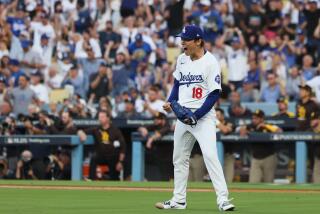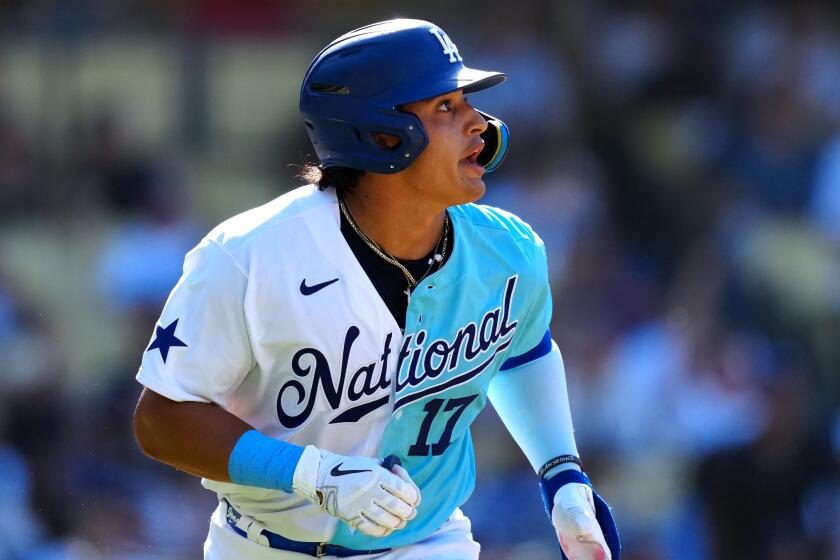Newcomer Hyun-Jin Ryu seems all right to Dodgers
PHOENIX — While working with Hyun-Jin Ryu in the first week of spring training, pitching coach Rick Honeycutt was reminded of another top-heavy left-hander who used to pitch for the Dodgers: Fernando Valenzuela.
“He has a presence about him,” Honeycutt said of Ryu.
Honeycutt hasn’t seen enough of Ryu to draw any conclusions about how he’ll transition from the Korean league to the majors, but he’s certain of this: The 25-year-old’s oversized torso is bursting with self-belief.
Others see it too.
“He does seem confident,” Manager Don Mattingly said.
Ryu doesn’t speak or understand much English, but he immediately looked comfortable in the clubhouse. He’s playful and often smiling. He has challenged teammates to ping-pong matches and made them by laugh by using a variety of hand gestures and facial expressions.
Honeycutt said that when he was traded to the Dodgers in 1983, he found Valenzuela to be the same way.
Ryu is one of eight highly paid starting pitchers in camp, but it appears certain he will be part of the five-man rotation. Asked if he would be open to pitching out of the bullpen, he replied matter-of-factly through a interpreter, “I don’t plan on that.”
A.J. Ellis caught Ryu’s first bullpen session of the spring and noticed he was unusually calm.
“He wasn’t trying to make a big first impression,” Ellis said. “He wasn’t overthrowing like a lot of guys do in their first side session.”
Ryu seems to be approaching his first game similarly. He is scheduled to pitch Sunday against the Chicago White Sox, but he said he wasn’t nervous.
“Not at all,” he said. “I’m scheduled to pitch one inning. I don’t care if I get hit hard. I’m more concerned about my command.”
He also doesn’t appear to be bothered by questions about his weight, which is listed at 215 pounds by the Dodgers.
“There’s two different shapes,” he said with a shrug. “One to be fit and one to throw a baseball.”
Third baseman Luis Cruz, who has become Ryu’s closest friend on the team, said it made sense that he would be so confident.
“He’s the best player in his country,” Cruz said.
Ryu’s rise to stardom had an almost supernatural origin.
Ryu is right-handed. He writes with his right hand, holds chopsticks with his right hand and grips a ping-pong paddle with his right hand.
But when he was 10 years old, his father bought him a left-handed glove. So he learned how to throw a baseball left-handed.
“It was just natural,” Ryu said.
He made his professional debut with the Hanwha Eagles at 19 and won the triple crown of pitching in the Korean league that season. He was an All-Star in each of his seven years in the league.
The Dodgers paid the Eagles $25.7 million for the exclusive rights to negotiate with him, then signed Ryu to a six-year, $36-million contract.
Over the years, Ryu developed a reputation in South Korea as an affable, fun-loving prodigy with a good sense of humor.
Honeycutt sees why. Honeycutt chuckled as he recalled Ryu approaching him after losing a ping-pong match to Manager Don Mattingly. Ryu’s explanation: In Korea, it would be considered impolite for a player to beat the manager.
Asked by Korean reporters how he would pitch to mentor and countryman Shin-Soo Choo of the Cleveland Indians, Ryu replied, “Behind his back.”
Most of Ryu’s humor comes at his own expense.
The first time he took swings in the batting cage, Ryu said he was told he had “a good golf swing.”
When he fell behind his teammates in a running drill, he said with a smile, “The other players don’t listen to what the trainers are saying. The trainers told us to run it in 35 seconds. Why are they running it in 26 seconds?”
He finished in the middle of the pack the next day — and made it a point to tell that to reporters. “I think it’s my time to show them how I really run,” he said.
The Dodgers were encouraged by Ryu’s improvement in fitness drills. His effort was taken as an indication that he wasn’t a clown and confirmed that his humor was a sign of confidence rather than a mechanism to avoid criticism.
“You want guys to compete,” Mattingly said. “You don’t want guys who don’t care.”
This matched what General Manager Ned Colletti read in his scouts’ reports on Ryu. “We had a variety of really good scouts that paid attention to him since he was 18 years old,” Colletti said. “We had different scouts keeping an eye on him at different stages. His competitiveness, that was always a constant.”
Of course, competitiveness and confidence by themselves don’t always translate into on-field success.
It can help, though.
“That’s a good start,” Honeycutt said. “A lot of us, it takes a long time. He has that in him.”
More to Read
Go beyond the scoreboard
Get the latest on L.A.'s teams in the daily Sports Report newsletter.
You may occasionally receive promotional content from the Los Angeles Times.










